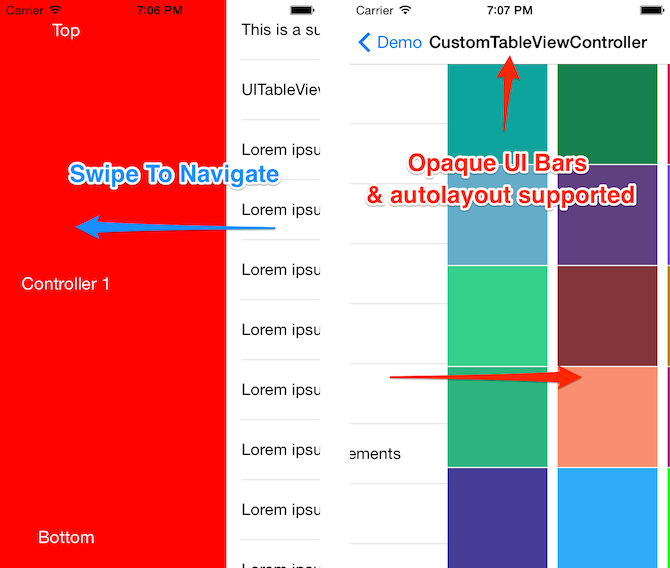Check out the demo project. Follow the steps below and make sure cocoapods is installed.
$ git clone https://github.com/mglagola/MGSwipeTabBarController.git
$ cd MGSwipeTabBarController/Demo
$ pod install
$ open Demo.xcworkspace/
CocoaPods is recommended.
- Add
pod 'MGSwipeTabBarController', '~>X.X'in yourPodfile. Fill in~>X.Xwith the latest pod spec version or:headif you live dangerously. #import <MGSwipeTabBarController/MGSwipeTabBarController.h>
- Drag and drop the
MGSwipeTabBarController/MGSwipeTabBarControllerFolder into your iOS project #import "MGSwipeTabBarController.h"
Option 1 - Init
NSArray *viewControllers = . . . //your view controllers
MGSwipeTabBarController *swipeController = [[MGSwipeTabBarController alloc] initWithViewControllers:viewControllers]; Option 2 - Setter
NSArray *viewControllers = . . . //your view controllers
MGSwipeTabBarController *swipeController = . . . // initialized some way (i.e. storyboard, nib, etc).
swipeController.viewControllers = viewControllers;@protocol MGSwipeTabBarControllerDelegate <NSObject>
@optional
/*
This method will be called prior to the start of the scroll animation.
NOTE: there is no bounds checking for this method.
So if the user attempts to scroll out of bounds, lets say from index 0 to off screen left,
then @toIndex = -1 and @fromIndex = 0.
This can be used to your advantage, see the Demo project.
*/
- (void) swipeTabBarController:(MGSwipeTabBarController*)swipeTabBarController
willScrollToIndex:(NSInteger)toIndex
fromIndex:(NSInteger)fromIndex;
/*
This method will be called after the scroll animation completes.
There is bounds checking here, unlike swipeTabBarController:willScrollToIndex:fromIndex:
*/
- (void) swipeTabBarController:(MGSwipeTabBarController*)swipeTabBarController
didScrollToIndex:(NSInteger)toIndex
fromIndex:(NSInteger)fromIndex;
- (void) swipeTabBarController:(MGSwipeTabBarController*)swipeTabBarController
panning:(CGFloat)pan;
@end
@interface MGSwipeTabBarController : UIViewController <UIGestureRecognizerDelegate>
extern CGFloat const kBPDefaultSelectedIndexAnimationDuration;
//The current view controller stack.
@property (nonatomic, strong) NSArray *viewControllers;
/*
The current selected index of the controller stack
Setting this property will also change the value of the 'selectedViewController'
property accordingly.
This cannot be set over the bounds of the viewController stack
This also cannot be set directly. Use the setters:
setSelectedIndex:animated: and
setSelectedIndex:animationDuration:completion:
*/
@property (nonatomic, readonly) NSInteger selectedIndex;
//Contains the value of the currently selected view controller of the controller stack
@property (nonatomic, weak, readonly) UIViewController *selectedViewController;
@property (nonatomic) id<MGSwipeTabBarControllerDelegate> delegate;
/*
Default is 0.5 (in seconds)
Value cannot be less than 0
Responsible for detecting swipes. Swipes are determinded
via the swipeInterval. if the pan gesture ended within
0 and the swipeInterval, a swipe has been detected and
will animate to the new tab.
*/
@property (nonatomic) NSTimeInterval swipeInterval;
@property (nonatomic, readonly) UIView *containerView;
- (id) initWithViewControllers:(NSArray*)viewControllers;
- (void) setSelectedIndex:(NSInteger)selectedIndex animated:(BOOL)animated;
- (void) setSelectedIndex:(NSInteger)selectedIndex animationDuration:(CGFloat)animationDuration completion:(void(^)(BOOL finished))completion;
@endThere is a bug currently with transparent UI bars. The demo demonstrates this bug. When I would seem to fix this issue for iOS 7, it would not work on iOS 8 and vice versa. The issue can be found here
